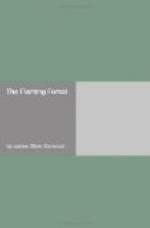And that was the Boulain Brigade—singing at this hour of the night, when men should have been sleeping if they expected to be up with the sun. Carrigan stared ahead. Shortly his adventure would take a new twist. Something was bound to happen when they got ashore. The peculiar glow of the fires had puzzled him. Now he began to understand. Jeanne Marie-Anne Boulain’s men were camped in the edge of the tar-sands and had lighted a number of natural gas-jets that came up out of the earth. Many times he had seen fires like these burning up and down the Three Rivers. He had lighted fires of his own; he had cooked over them and had afterward had the fun and excitement of extinguishing them with pails of water. But he had never seen anything quite like this that was unfolding itself before his eyes now. There were seven of the fires over an area of half an acre—spouts of yellowish flame burning like giant torches ten or fifteen feet in the air. And between them he very soon made out great bustle and activity. Many figures were moving about. They looked like dwarfs at first, gnomes at play in a little world made out of witchcraft. But Bateese was sending the canoe nearer with powerful strokes, and the figures grew taller, and the spouts of flame higher. Then he knew what was happening. The Boulain men were taking advantage of the cool hours of the night and were tarring up.
He could smell the tar, and he could see the big York boats drawn up in the circle of yellowish light. There were half a dozen of them, and men stripped to the waist were smearing the bottoms of the boats with boiling tar and pitch. In the center was a big, black cauldron steaming over a gas-jet, and between this cauldron and the boats men were running back and forth with pails. Still nearer to the huge kettle other men were filling a row of kegs with the precious black GOUDRON that oozed up from the bowels of the earth, forming here and there jet-black pools that Carrigan could see glistening in the flare of the gas-lamps. He figured there were thirty men at work. Six big York boats were turned keel up in the black sand. Close inshore, just outside the circle of light, was a single scow.
Toward this scow Bateese sent the canoe. And as they drew nearer, until the laboring men ashore were scarcely a stone’s throw away, the weirdness of the scene impressed itself more upon Carrigan. Never had he seen such a crew. There were no Indians among them. Lithe, quick-moving, bare-headed, their naked arms and shoulders gleaming in the ghostly illumination, they were racing against time with the boiling tar and pitch in the cauldron. They did not see the approach of the canoe, and Bateese did not draw their attention to it. Quietly he drove the birchbark under the shadow of the big bateau. Hands were waiting to seize and steady it. Carrigan caught but a glimpse of the faces. In another instant the girl was aboard the scow, and Bateese was bending over him. A second time he was picked




